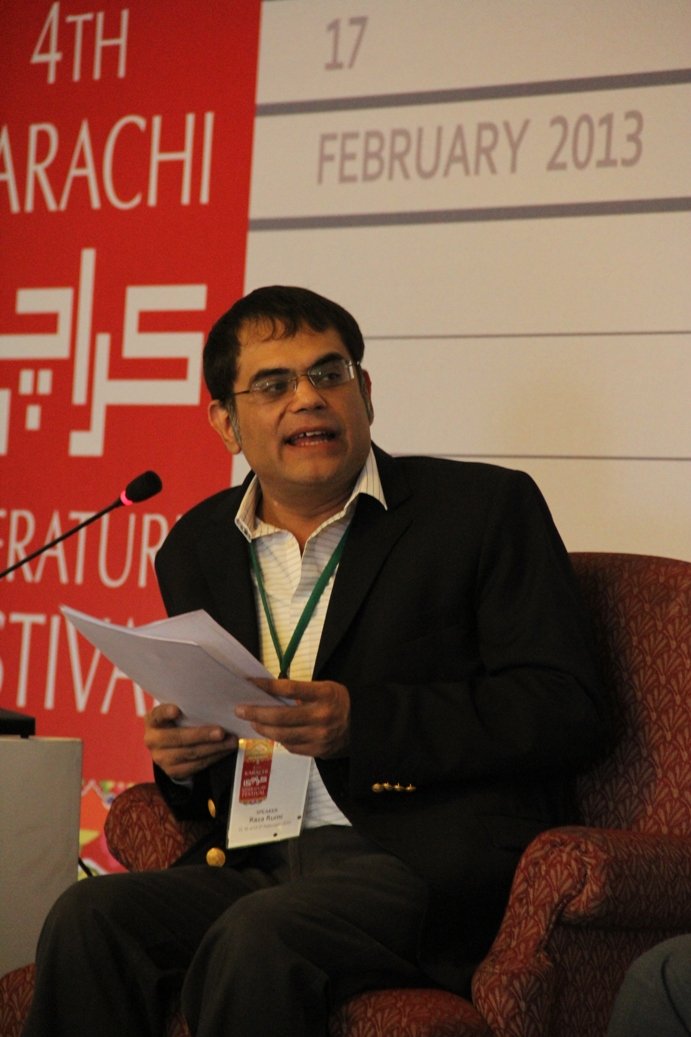
Appeasing the audience with a little humour here and there, Noorani tried to kill time amid Rumi’s absence in the 007 room. His offer to initiate the latter half of the session on Pakistani nationalism was welcomed by the audience, however the collective joy was short-lived when Rumi finally showed up.
Given the subject of Rumi’s book, Noorani initiated the conversation with an obvious question: Why Delhi and not Lucknow for instance? “To be honest, I couldn’t arrange for a visa to Lucknow,” said Rumi to the anxious audience who acknowledged him with dispersed chuckles. Rumi admitted that the account on his travels took shape of a book quite accidentally. “I had been working at the Asian Development Bank and frequented Delhi for a lot of boring projects, and it was during my visits that I realised the wondrous nature of the place.”
The realisation that a continuum of 900-odd-years-old culture that connected the two lands each side of the border, manifested in reference points like language and history of the people, served as inspiration for Rumi. “There is a larger force of history and culture at work, which cannot be undone by a narrative of 67 years.”
Delving deeper into the rhetoric, Noorani noted Rumi’s use of the term ‘multi-petalled lotus’ to describe Delhi, and asked him what was it really, that he found different about the city. In response, Rumi brought forth the perennial Pakistani mindset: ‘India’s the bad guy’ in admitting that because he went through the same education as others across the country, he was victimised by the same. While reading cross-border literature allows one to shed some of those ill-informed conceptions, the fundamentals for Rumi remain, only until you actually pay visit. “You roam the streets and while one ear rings with the azans, you can hear bhajans in the other.”
During the question answer session, Noorani smoothly pointed towards a lady “because I have a softer corner for them.” “Khushwant Singh and Intizar Hussain have both penned down accounts on Delhi, so what’s different in your book?” was the question, to which Rumi promptly flashed the ‘I represent Gen Y’ card. “You can possibly call my voice as perhaps, a post-modern account compared to preceding ones.”
In response to another question Rumi revealed he is working on an Urdu translation of the version, but he wrote his book in English because it grants a bigger audience.
Cue: Javed Jabbar and panelists
There was a general vibe in the room that this was the session audiences had originally intended to attend. While it addressed the increasingly concerning extremist threat to Pakistani nationalism, limited time meant Javed Jabbar (moderator) and his panellists, historian, Syed Jaffar Ahmed and Sindhi journalist, Mohsin Babbar, could barely scrape the surface.
Duly admitting conflict of interest, because after all it was Jabbar’s own book, “Pakistan - Unique Origins; Unique Destiny” that served as the underpinning force for the theme in discussion, he started with a brief account of his book. Shedding light on some of the factors that he has identified for the creation of Pakistan, he said while religion was one, it was not the only factor behind the larger Pakistani nationalism. And religion is now becoming the biggest extremist threat to nationalism. “However, Pakistaniat is emerging, and being Muslim is part of that,” contended Jabbar.
Disagreeing with Jabbar, Ahmed was of the opinion that “unfortunately there is no Pakistani nationalism, however a good start would be to integrate all the different nationalities, giving every citizen ownership and making the country a secular state.” The conflict according to him emerges as a result of a lack in abilities for everyone to assimilate.
Babbar who also translated Jabbar’s book in Sindhi, laced his remarks with appeasing the moderator. However, he presented the peculiar case of Sindhi nationalism, whereby in Sindh, August 14 is not celebrated with the same vigour as in the rest of the country, with urban Sindh being the only exception. The panel converged on an integrative approach towards nationalism, to get rid of the increasing threat of extremism.

















COMMENTS
Comments are moderated and generally will be posted if they are on-topic and not abusive.
For more information, please see our Comments FAQ